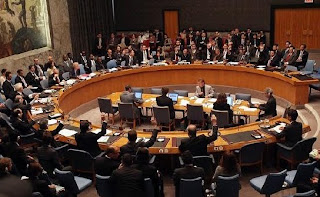 I just finished reading the UN Security Council’s latest Cross-Cutting Report on The Security Council’s Role in Disarmament and Arms Control; Nuclear Weapons, Nonproliferation and Other Weapons of Mass Destruction.
I just finished reading the UN Security Council’s latest Cross-Cutting Report on The Security Council’s Role in Disarmament and Arms Control; Nuclear Weapons, Nonproliferation and Other Weapons of Mass Destruction.
It’s an excellent overview for non-experts on the relationship of the UN Security Council to nuclear diplomacy. Background sections cover the history of UNSC’s involvement in disarmament and arms control and why it mostly failed during the Cold War; the nature of alternative bilateral and non-UNSC multilateral arrangements to date and their drawbacks; the Security Council’s engagement with a series of WMD crises since 1977; and the relationship between nuclear weapons and other WMD (though the report accepts as valid the socially constructed distinction between WMD and conventional weapons – obviously the authors haven’t read Tannenwald). Anyway, it’s useful reading for anyone wanting the current skinny on disarmament and non-proliferation regimes and where the UNSC fits.
But the report also includes an optimistic, forward-looking and (I think) a little bit naive appraisal of the Council’s resurgent role in nuclear diplomacy, which was set out in Article 26 of the UN Charter but fell by the wayside for much of the UN’s history:
“The Security Council has shown… that it has the potential – and the power, if it chooses to exercise it – to contribute to addressing both specific and broader disarmament dimensions of security issues… Clearly there are a huge range of options the Council members can pursue in their national capacities that would have positive impacts on the disarmament and non-proliferation agenda.”
These, the report goes on, include “national statements in UNSC debates, committing the UNSC to “play a regular role,” an annual high-level meeting, an omnibus resolution bringing together and updating existing resolutions, statement and decisions on disarmament; and “establishing a high-level subsidiary body to support the Council in discharging a strategic-level role in the area of disarmament, arms control and non-proliferation.”
But most of avenues envisioned here for SC involvement seem halfhearted and largely rhetorical. On the one hand, the Security Council has one thing going for it that other nonproliferation forums lack: a 2/3 majority voting process rather than a consensus process where every stakeholder has a veto. On the other hand, the P5 veto dilutes this advantage for all issues; and it’s particularly problematic on nuclear policy given that the P5 are all on one side of the disarmament debate. Indeed the report’s appraisal of the SC’s earlier efforts at nuclear diplomacy paints a more somber picture of its ability to exert more than an epiphenomenal effect on political outcomes, for this very reason:
“The P5 – all of whom have nuclear weapons – seem unusually united about compliance with the nonproliferation obligations in the NPT and preventing other states and nonstate actors from acquiring nuclear weapons. However, the Council’s record of effectively addressing the parallel obligations on the P5 under article VI of the NPT [which requires nuclear states to work in good faith toward disarmament] is almost completely absent in any practical sense… Council action against state proliferation has been uneven and is often criticised as selective… it has acted firmly against nuclear programmes in Iraq, the DPRK and Iran. Nuclear weapons programmes in Israel, Pakistan and India were largely ignored.”
As anyone schooled in realist theory knows, this is precisely the pattern that would be predicted in the absence of the Security Council.
So ultimately I think it is naive to place much faith in the UNSC as a bulwark against nuclear proliferation. This doesn’t mean it’s entirely devoid of power. The UNSC is good for three things, all significant:
First, as Inis Claude famously argued, it functions as a collective legitimation body, so it has some role to play in reproducing norms negotiated in other forums like the Conference on Disarmament. Second, it may be poor at helping states escape collective action dilemmas, but it does constitute a forum for states to coordinate policy responses vis-a-vis non-state actors – perhaps it should be taking the lead particularly on this aspect of non-proliferation policy. Third, as any civil society actor who has attempted to influence a Security Council resolution knows, it functions to securitize issues: the agenda of the UN Security Council is considered a signal to the global community about the significance of threats and concerns, and in this sense alone its re-engagement with disarmament and proliferation issues is important.
Doesn’t mean we should pin all our hopes on New York, however. I think it is far more significant that the United States is now playing a lead role on nonproliferation issues as well holding the rotating Presidency for the month of September. To the extent that the UNSC has power to play a constructive role, it will be wielded through sympathetic P5 governments.
Charli Carpenter is a Professor in the Department of Political Science at the University of Massachusetts-Amherst. She is the author of 'Innocent Women and Children': Gender, Norms and the Protection of Civilians (Ashgate, 2006), Forgetting Children Born of War: Setting the Human Rights
Agenda in Bosnia and Beyond (Columbia, 2010), and ‘Lost’ Causes: Agenda-Setting in Global Issue Networks and the Shaping of Human Security (Cornell, 2014). Her main research interests include national security ethics, the protection of civilians, the laws of war, global agenda-setting, gender and political violence, humanitarian affairs, the role of information technology in human security, and the gap between intentions and outcomes among advocates of human security.

0 Comments